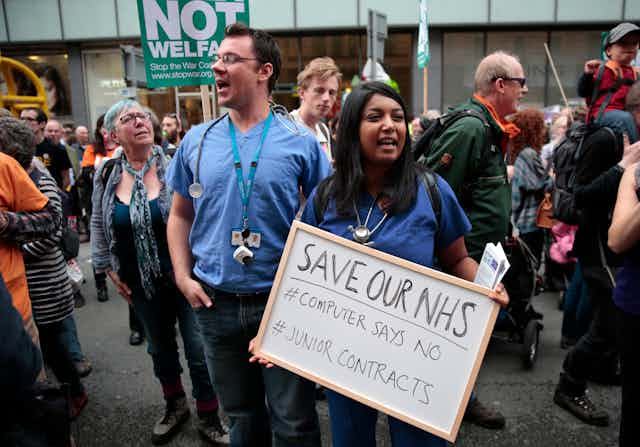The health secretary, Jeremy Hunt, has capitulated to threats of a damaging strike by junior doctors. After vocal protests from the medical profession, Hunt has modified his plans to scrap overtime pay rates for junior doctors.
Their proposed action does not threaten the treatment of acute, life-threatening emergencies. But it did have recent precedents that produced mass disruption of outpatient clinics and the cancellation of non-urgent surgery. In threatening to impose a punitive new contract on junior doctors without prior discussion, the health secretary underestimated both the contribution and the power of these essential staff. Indeed, he may have to make further concessions.
Hunt has high ideals for the NHS. He wants an efficient, consumer-friendly seven-day service with fewer bureaucratic targets and more public transparency. Laudable aspirations, but improving the NHS while having to make £22bn of savings is asking a lot of the good will of its staff.
Messing with the backbone
Hunt’s problem was that he didn’t see the value of this medical good will. He has already tested that of consultant doctors by threatening to force them to work any day of the week, in order to address claims that 6,000 people die every year because of inadequate service at weekends (consultants can currently opt out of non-emergency weekend work).
He has now similarly antagonised their junior colleagues. Juniors are the diagnostic backbone of all the out-of-hours work the NHS does. Being invited compulsorily to do the same work for what they claimed was 40% less cash was, they said: “Bad for patients, bad for junior doctors and bad for the NHS”.
The medical profession has legally sanctioned control over everything the NHS does. It has unrestrained clinical freedom in diagnosis, admissions, discharges, prescriptions and operations. It polices its boundaries relentlessly and nothing it does, however simplistic, can be delegated to any other professional if it is in the medical interest. Tasks such as pre-anaesthetic screening or ordering blood tests have only been given to nurses because medical staff have come to recognise these as low status. This closed-shop process masquerades always as “patient interest” on the pretext that “doctor knows best”.

Medicine is the unmistaken spending agent of the NHS and governments have yearned to bring it under political and managerial control since Aneurin Bevan founded the service in 1948. He quickly discovered the British Medial Association to be the most cohesively coldblooded negotiating body in civilisation. Why? Because it manipulates its scarce skills resource precisely to secure the rewards it believes its superior quality deserves.
Bevan captured medical cooperation in 1948 only through massive contractual concessions, stating: “I stuffed their mouths with gold.” So “buying off” is an institutional norm in the NHS: governments threaten doctors’ pay and conditions – and, in response, they promise strike action that ministers cannot allow for fear of political fallout. So the doctors win whatever sized “inconvenience allowance” they believe they warrant. And the whole charade creates the fantasy that the politicians have won and we all carry on as if nothing had happened.
Professional unity
Doctors may squabble fiercely among themselves but any perceived threat from outsiders – be they politicians, managers or whomever – provokes intense professional unity. Hunt should have realised, as Bevan did, that he would not just aggravate the junior doctors but the whole profession.
Hunt’s attempt to resolve the recent conflict was absolutely predictable. It entirely followed the Bevan formula that unfailingly unlocks the gate to medical “capitulation”. The junior doctors have not yet agreed to Hunt’s offer but his flattery and applause has somewhat neutralised the ill intent that threatened their wallets. When it comes to settling the next little difficulty of weekend working for consultants and GPs, Hunt will need all the same charm and an even heftier remunerative donation to the medical satchel.
Making a success of being health secretary and handling the doctors well is usually a step towards promotion. In the previous decade, the turbulence Alan Milburn experienced as health secretary was instantly calmed when his successor, John Reid, pacified the profession with generous contracts. After this success, Reid went on to become defence secretary. Likewise Alan Johnson managed to come to an agreement with GPs and became home secretary. So if Hunt values his political career in the way his recent conference performance indicates, he will benefit little from a defeat in a doctors’ dispute on his record.

